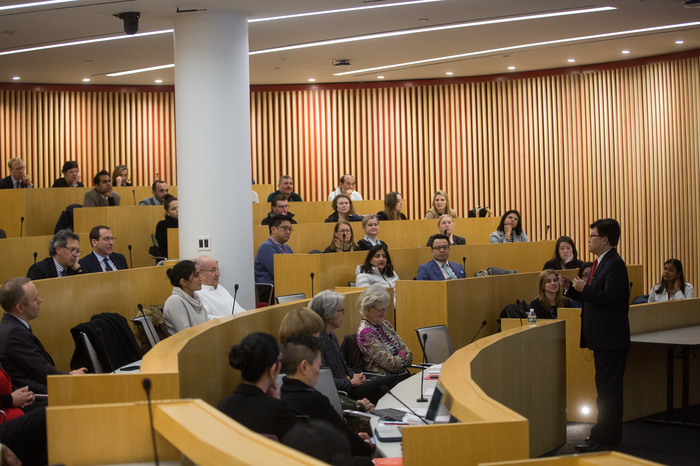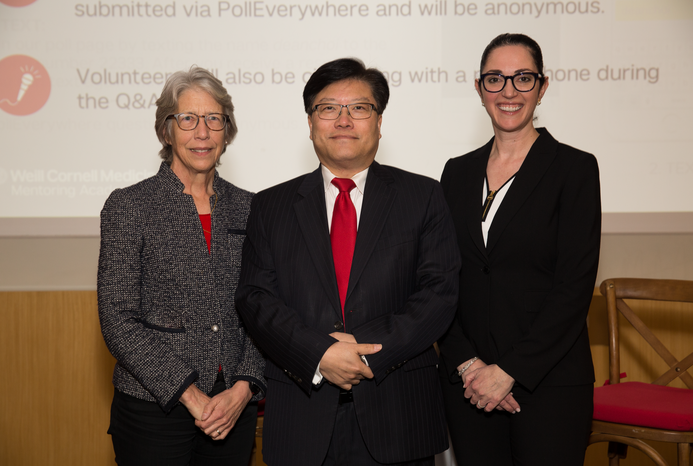Medicine is all about caring for others, making the scientific discipline and mentoring a natural fit. But when it comes down to the day-to-day demands on academic researchers and faculty, potential mentors and mentees often need encouragement and guidance—or even better, as Dr. Augustine M.K. Choi, the Stephen and Suzanne Weiss Dean of Weill Cornell Medicine, envisions it, a “culture of mentorship.”
“Why do we care about mentoring?” he asked Jan. 30 during a town hall at Weill Auditorium. “Because mentoring really matters—in academic medicine especially, as we strive to fuel advances in medicine and science, it really matters.”
The town hall capped the January celebration of National Mentoring Month at Weill Cornell Medicine, an event that reflected Dr. Choi’s effort to make mentorship an institutional priority. His vision is to foster mentorship at all levels as a way to nurture the next generation of healthcare leaders, and a key step in that process was the 2018 creation of Weill Cornell Medicine’s Mentoring Academy, housed within the Office of Faculty Development that is led by newly appointed Senior Associate Dean for Faculty Dr. Katherine Hajjar.
“Weill Cornell Medicine is leading the way in establishing mentorship as a vital priority in academic medicine,” Dr. Hajjar said. “These efforts will have a lasting effect on our 1,800 full-time faculty members, who can then pay it forward to generations of future physicians and scientists.”
There’s already plenty of evidence that when collaboration and shared goals prevail, the payoffs flow in all directions. “There’s quite a bit of research that shows that those who are mentored outperform and out-earn those who are not,” said Dr. Ruth Gotian, assistant dean for mentoring who leads the Mentoring Academy. “Their burnout is lower, their salaries and promotions are better. We expect the Mentoring Academy to augment these important findings, which we will eventually share with the outside world.”
Mentors meanwhile benefit from exposure to new ideas and knowledge, leading to more publications, collaborations and opportunities all around.

Dr. Choi at the Mentoring Town Hall on Jan. 30.
Training and consciousness-raising are important because mentoring doesn’t always come naturally to focused strivers in a competitive setting. During his informal remarks, Dr. Choi candidly noted that early in his career he was on the receiving end of less-than-perfect mentoring, an experience that has made him all the more determined to foster a rich and supportive mentoring culture.
“Mentor-mentee relationships can be tough,” he acknowledged. “You have to meet at the 50-yard line."
For both sides of the relationship, “this is a priceless responsibility; you just don’t show up and have a strong connection. You have to earn it.” Mentors make sacrifices in terms of their time—always in short supply—and a mentee is not a passive receptacle, he stressed. “You also have to perform.”
This is something Dr. Choi knows from first-hand experience. He has dedicated his career to mentoring others, work he continues now as he leads Weill Cornell Medicine. Currently, Dr. Choi is mentoring six early-career faculty members, six post-doctoral fellows and two medical students. Just as he has served as their cheerleader, he said, his mentees are teaching him about new lines of scientific inquiry.
Effective mentors and mentees can be at any stage of their careers, and indeed senior peers often step into mentoring relationships. Dr. Choi noted.
“There’s a lot of peer mentoring going on in the Dean’s Office,” he said. “We mentor each other,” he said, “because no single person has all the expertise and insight.”
And the mentor-mentee relationship doesn’t just exist in the professional sphere, Dr. Choi said, referring to his wife, Dr. Mary E. Choi, a professor of medicine at Weill Cornell Medicine.
“Your best mentor can be your spouse, or your partner,” he said. “The best mentors are those who you trust and who know you best, and Mary has been a fantastic mentor for me for nearly 33 years.”
In addition to Dr. Choi’s town hall, Mentoring Month included a keynote address from Cornell University President Martha E. Pollack, and several workshops on topics including how to bolster emotional intelligence for more effective leadership and mentorship, impactful strategies for quiet leaders, measuring the habits of highly effective leaders, and creative ways to enhance mentorship.

